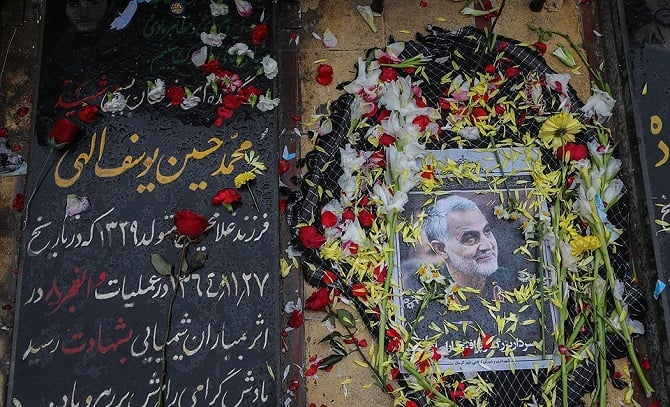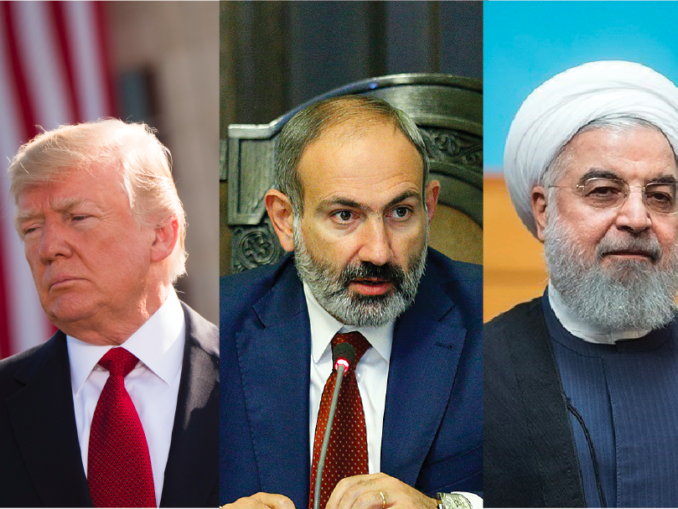The Armenian Weekly. Armenian Prime Minister Nikol Pashinyan has called for level heads to prevail as tensions in the region flared over the death of top Iranian General Qassem Soleimani in last week’s US airstrike. Broadcasting on Facebook Live during a hike in the Armenian mountains, the Prime Minister stressed the importance of Armenia avoiding entanglement on either side of a potential escalation between the two countries. “Our message is for our partners of Iran and the United States to refrain from steps that would aggravate the already tense situation in our region and international relations,” he declared from atop a mountain, flanked by accompanying hikers, including repatriates from Iran and the United States.
https://www.facebook.com/nikol.pashinyan/videos/502508767044965/
Authorities in Yerevan were quick to react to the targeted airstrike last Friday, which killed the high-profile head of the Islamic Republic of Iran’s controversial Quds Force as well as Iraqi paramilitary leaders. Foreign Minister Zohrab Mnatsakanyan reportedly expressed condolences to his Iranian counterpart Mohammad Javad Zarif in a phone call apparently initiated by the Iranian side for the loss of the prominent military figure, but stopped short of condemning the US action. Armenia’s top diplomats and military brass convened for an emergency meeting later on Friday to assess the developing strategic situation in the Middle East and to discuss contingency plans for various scenarios.

Qassem Soleimani’s prepared grave at Kerman Martyrs Cemetery, January 5, 2020 (Photo: Fars News Agency/Mohammad Ali Marizad/Creative Commons Attribution 4.0 International License)
Iran has vowed to retaliate against US strategic assets in the region over the killing of the top general, which it described as both “an act of war” and “state terrorism.” The White House countered that Soleimani posed a legitimate target due to his alleged involvement in violence surrounding the US embassy in Baghdad over Christmas. Analysts have suggested that Iran would employ its proxies across the Middle East to hit US soft targets in the region. However, Tehran has publicly ruled out asymmetric warfare, opting instead to target US military personnel directly. Early Wednesday morning, Iranian missiles struck two US bases in Iraq, claiming to have killed up to 80 Americans. Hours later at the White House, President Donald Trump announced that Americans did not perish in the attack. “We suffered no casualties. Iran appears to be standing down,” said President Trump before noting the imposition of more sanctions on the Iranian regime until it “changes its behavior.”
Read also
Despite Yerevan’s repeated assertions of neutrality in any potential US-Iranian conflict, many in Armenia fear that due to geographical proximity and economic ties to Iran, the country would certainly be affected by any hostilities in the region. Both Iran and the United States are home to very large Armenian minorities, with the 100,000 or so members of Iran’s 400-year-old Armenian community concentrated in the cities of Tehran, Isfahan and Urmia with more rural communities stretched along the Iran-Armenian border. President Trump’s call to destroy Iranian cultural sites has also led to concern over the security of priceless Armenian cultural icons which dot the country, including the Saint Stepanos and Saint Thaddeus monasteries located just cross the border from present-day Armenia and New Julfa. Many Iranians have taken to social media to share photos of the country’s world-renowned cultural and historical landmarks, including Armenian sites.
Iran is also a major Armenian trade partner, as well as a vital route for almost one-third of Armenian goods headed to international markets due to the ongoing illegal blockade of two international borders by Turkey and Azerbaijan over the unresolved Karabakh conflict. Trade turnover between the two countries reached $364 million last year despite Armenia’s reluctant compliance with re-imposed US sanctions on Iranian assets. Armenia has also been the leading voice inside the Moscow-led Eurasian Economic Union for closer economic ties with Iran, even spearheading the ratification of a historic free trade agreement earlier this year.
The United States Embassy in Yerevan announced that it would be temporarily suspending all visa and consular services for Iranian citizens, citing the ongoing diplomatic crisis between the two countries as a reason. “The U.S. Embassy consular section has notified applicants whose appointments have been canceled via email,” read the statement on their website. The embassy in Yerevan has traditionally served Iranians as well, being the closest US diplomatic mission to Iran since the Tehran facility was closed following the 1979 Iranian Revolution.
Armenia’s National Security Service (NSS) also arrested a man over the weekend who allegedly used a fake social media handle to spread false information “potentially harmful to Armenia’s national security interests.” According to the NSS, the man set up a Facebook page under the assumed identity Diana Arutyunyan to spread claims that Pashinyan had congratulated Trump over the targeted drone strike which killed Soleimani. Though the man’s identity has yet to be made public, a video released by the NSS depicts the suspect, a self-described supporter of disgraced former President Robert Kocharyan, admitting to being behind the page setup to spread disinformation about the Pashinyan administration. He is being charged with “inciting national, racial and religious hostility” under the Armenian Criminal Code.
Pashinyan himself reacted to the arrest, calling the suspect’s claim “fake news.” The Prime Minister did not congratulate Trump, nor did he speak with him at all following the airstrike. Instead, his administration expressed concern over US escalation of tensions. “It is our hope that friendly Iran and the United States will initiate immediate negotiations to prevent further deterioration,” the Prime Minister later repeated.
The suspect’s admission to spreading “fake news” did not stop Azerbaijani State Media from picking up the story, however. According to analyst Emil Sanamyan, Azerbaijani sources have also propagated photos purporting to show Soleimani with Armenian military commander Monte Melkonian as evidence of Iran’s support of the Armenian side during the 1988-1994 Karabakh War. However, as Facebook user George Arakelian pointed out, the photo in question was actually taken in 2015, 22 years after Melkonian’s death. Not only had the two never met in person, but Melkonian’s well-publicized sympathies for Iranian Kurds also would have placed them at odds.
For his part, Pashinyan continues to call for de-escalating tensions, pointing to Armenia’s historically close relations with both Iran and the United States. He has also made assurances that all relevant government bodies were closely monitoring the rapidly developing situation.




















































